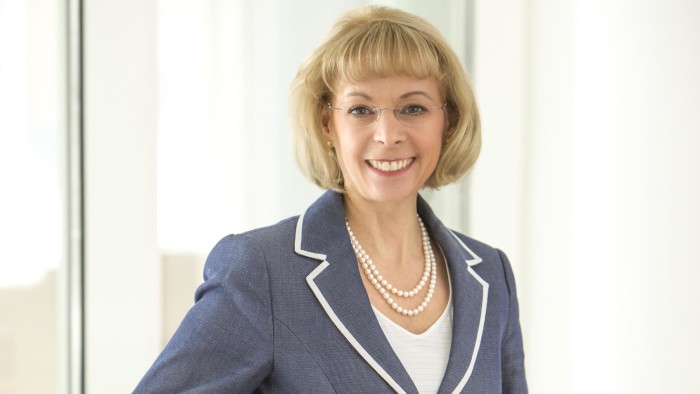Women in Business — Nancy McKinstry, Wolters Kluwer

Roula Khalaf, Editor of the FT, selects her favourite stories in this weekly newsletter.
Nancy McKinstry is chief executive of Wolters Kluwer, the global information services company, and an MBA graduate of Columbia Business School in the US. Since Ms McKinstry joined Wolters Kluwer in 2003, the number of women in senior positions has risen from 20 per cent to 50 per cent. It is now the only listed company in the Netherlands that already meets the government’s aim for company boards to consist of 30 per cent women by 2016.
Born in the US, Ms McKinstry is the first female and non-Dutch leader of Wolters Kluwer. Her first job was at a telecoms company, working in pricing models and using mainframe computers. She worked there for two years before applying to study for an MBA in 1982.
1. How did you implement change at Wolters Kluwer?
Being ‘different’ allowed me to drive the business forward and deliver change. Gender did play a role in helping to drive that change — women tend to be better communicators and more astute at spotting talent, which were critical factors in transforming the business. But being non-Dutch was a bigger factor. I think it would have been much harder to create a sense of urgency for change if the person hired had been very similar to the predecessor.
2. Who inspires you?
I have been greatly inspired by the watching the likes of Steve Jobs at Apple and Louis Gerstner at IBM, for their flair for innovation and record of business transformation.
3. What academic achievement are you most proud of?
My MBA at Columbia. If I look back on my career and consider the smart business decisions — that was one. That fundamental grounding in business principles was phenomenal training for me.
4. Which professor do you admire most?
Economics professor Joel Dirlam at the University of Rhode Island. I became his teaching assistant while studying there in 1980. He was this stereotypical absent-minded professor but he really taught me a lot about economics and how to put it into practice.
5. What was your biggest lesson learnt at business school?
The accounting courses were very important because they taught me to speak the language of business. Analysing a business, understanding a company’s value and dissecting how it makes money are the tools you can take with you into any business.
6. What advice would you give to women graduating this year from business school?
My advice for anyone wanting to be a senior manager (female or male) is the same: communicate, deliver results and drive a team. You need a vision for the business and good written and oral communication skills. Having an expert team in place is also essential — everything works better if you do it in a team environment.
One thing I would add, though, is that women are often more criticised for their personal choices than men are: how much time you spend or don’t spend with your family, what you wear, etc. Being a chief executive means making tough choices and sacrifices about where you spend your time. You have to be really secure in your choices and close your ears to the criticism.
7. What would you do if you were dean for the day?
I would stress the importance of global experience — it is essential for senior managers to have a global perspective today. I would advise anyone [European] who hasn’t worked outside Europe to work in Asia and the US.
8. What challenges do business schools today face?
The price/value equation. If I look at what I was earning pre-MBA and the first year out, the return was incredible. I don’t think it is quite that way now. I think top business schools have it a bit easier but at middle level it is a tough scenario.
9. What is your favourite business book?
Who Says Elephants Can’t Dance? Leading a Great Enterprise through Dramatic Change by Louis Gerstner Jr, who turned around IBM. I read this book very early in my career as a chief executive. It’s all about changing culture and how you need to use a burning platform to get change to happen so it was very relevant to what I was trying to do at Wolters Kluwer. It’s a book that I often go back to.
10. What is the last book you read?
On the business side Lean In by Sheryl Sandberg and on the personal side Cleopatra: A Life by Stacey Schiff. It is a fascinating biography.
Comments